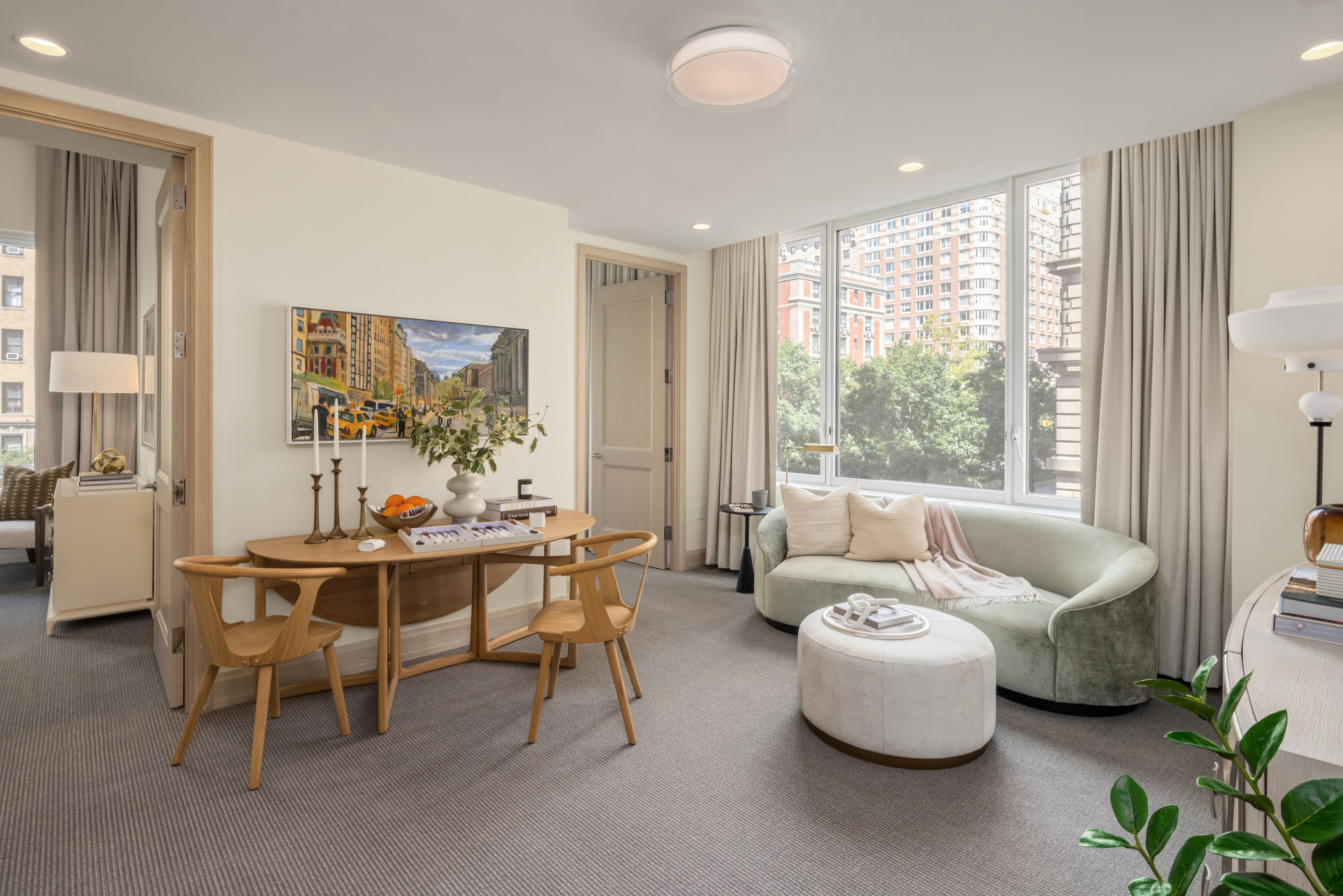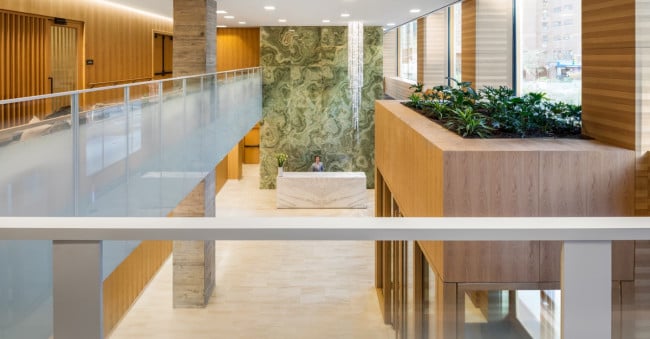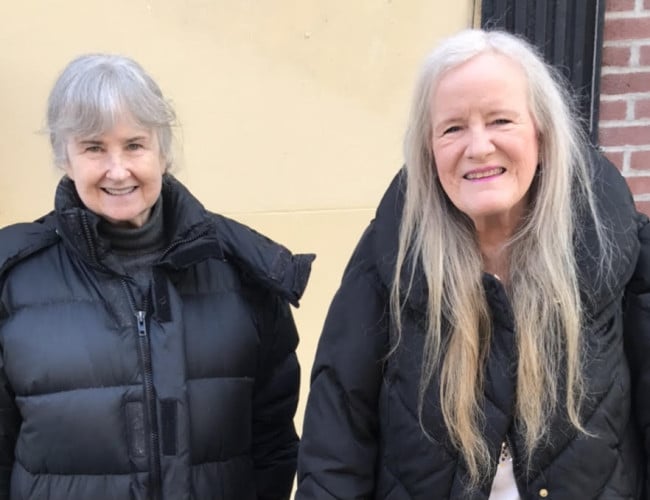What is independent living? A guide to the costs and services available at modern NYC senior developments
- Monthly rent can run $6,000 to over $15,000 for a studio and $7,000 to over $20,000 for a one bedroom
- The cost includes 24/7 hospitality services, housekeeping, access to amenities, and group activities

Being able to take art and other classes with fellow seniors is a big draw at independent living residences like Inspīr Carnegie Hill.
Courtesy of Inspīr Carnegie Hill
These days the term "senior living" is not limited to retirement communities and nursing homes. Independent living developments now cater to healthy, active, self-sufficient residents and in dignified settings that emphasize wellness.
The concept isn't exactly new. But modern iterations swap golf courses and Bingo for a full slate of daily activities—educational, cultural, and otherwise. And this being New York City, the idea is getting upscale treatment with a handful of luxe independent living communities.
Still, navigating the senior living space in NYC can be confusing. For starters, developments tend to offer different levels of care—independent, assisted/enhanced, and memory care—all under one roof.
Perceptions of traditional facilities can be an obstacle to understanding modern senior living residences. "This is often the first conversation we have with prospective residents," says Rocco Bertini, executive director of The Watermark at Brooklyn Heights.
Shaun Pappas, a partner at NYC law firm Starr Associates who works with developers of luxury residential properties as well as hospitality groups, agrees there's confusion on all sides.
"One of the biggest distinctions is that these new senior living residences are presented as a community of similarly aged individuals living together with different types of amenities and activities. However, they typically do not provide medical treatment or oversight, though they may offer a certain quality of life and health initiatives. It is less about 'care' and more about 'community' and 'wellness,'" he says.
Brick dug deep to answer common questions so you know what to expect—and can make informed decisions in exploring your options.
Why would someone want to live in an independent living residence?
Imagine no longer having to deal with household chores and routine maintenance while living in a private apartment and remaining independent in going about the day. You'll also have convenient access to amenities, services, and scheduled group activities that make life easier and more enjoyable. (More on those below.)
And even though these places are designed to offer everything on site, residents stay connected to the surrounding community and all the city has to offer through partnerships with museums, schools, and other organizations. Want tickets to the opera or theater? A concierge is there to help. Meeting a friend for lunch across town? Transportation is available.
What kinds of care are available to independent living residents?
Senior living residences are geared toward people (we see you Baby Boomers!) who are looking to maintain a certain lifestyle and don't require round-the-clock medical care and advanced support at skilled nursing homes.
That said, many senior developments offer independent living as well as assisted living (for people who need personal care with daily tasks such as getting dressed and managing medication) and memory care (for residents with Alzheimer's or other forms of dementia). Residents can transition to another level as needed, without having to move to a new development or even a new unit (though memory care residents have enhanced units on designated floors.)
For example, Inspīr Carnegie Hill provides three licensed care programs: Sol (assisted living), Terra (enhanced care), and Oceana (memory care), ranging from as-needed services to full-time care with personalized medical and wellness programming.
And because these buildings are licensed by the state as assisted living facilities, they provide a similar level of care as nursing homes, says Joanna Mansfield, registered nurse and general manager of Coterie Hudson Yards. They also tend to make up the difference by outsourcing medical and emergency care services that are made available to residents as needed.
At Coterie, for example, concierge emergency provider Sollis Health has offices in the building. Sunrise East 56 has contracted Northwell Health to give residents access to an attending physician. One resident named Allen says, "Northwell's expertise made it easy for me to transition under their care. I use it for all my medical needs now and have dropped most of my other specialists."

What are the units like?
The individual units are unfurnished, come with a private bath, and look just like regular apartments.
There's usually a variety of floor plans for studios and one-bedroom units with either kitchenettes or full kitchens. Newer developments sometimes have two and three bedrooms and even penthouses, such as at Inspīr.
As with all residential buildings in NYC, the design ranges from pre- and post-war conversions to brand-new high rises.
How much do they cost?
It helps to have an understanding of the potential fees and costs to avoid sticker shock—suffice to say that rents are steep.
That's especially true for the brand-new upscale communities cropping up across the city. "These developers have identified an affluent aging community and are creating a niche," Pappas says.
Independent living studios tend to start at around $6,500 per month and two bedrooms can top out at close to $40,000 per month, with lots of wiggle room in between those figures depending on the type and location of the building.
Units at even established senior residences like Atria West 86, which opened 20 years ago, start at $8,300 per month.
Shared units will typically be charged an additional fee. For example, The Watermark charges a second occupancy fee of $1,495 a month.

What's included in the monthly rate?
Generally speaking, the monthly rent covers utilities, weekly housekeeping/linen service, and maintenance, plus 24/7 hospitality and the use of all amenities. Most (if not all) buildings in NYC include a fitness center, indoor swimming pool, library, salon, and transportation (on-demand cars or scheduled vans) within the city.
A daily schedule of activities—tai chi, writing workshops, wine tastings, you name it—is baked into the rent as well.
Three meals per day are also included, often created by chefs in stylish settings, though cocktails are often on you (though Inspīr covers two drinks per day).
Some places charge a one-time membership or introductory fee on top of the rent, so be sure to inquire about that. For example, Brookdale Battery Park City charges a one-time community fee to new members, equal to one month's rent, but that is transferable to all Brookdale communities across the country.
Other services (such as at an on-site salon or spa) will be a la carte, as are catered meals for private gatherings. "Families love to congregate here for holidays and special occasions and avoid having their loved one travel in lousy weather," Mansfield says.
What are the lease terms?
Leases are usually month to month. Refund policies vary. Bertini says The Watermark will refund a prorated portion to anyone leaving other than the last day of the month and with 30-days' notice in writing of termination. Brookdale has a similar policy but requires a 60-day written notice.
Deposits are generally required to hold a unit; whether these are refundable depends on the building. (The Watermark has a fully refundable $5,000 deposit to hold a unit for 30 days.)
Is financing available?
The answer is no. As with any rental, you'll be expected to pay out of pocket, though most places accept credit cards so you can rack up points.
Residents often use money from selling a home to cover the costs or rely on retirement savings, pensions, investments, or private loans. Note that long-term care insurance and life insurance policies sometimes cover assisted living and memory care but not independent living, unless some level of personal care is being provided.
As always, it's wise to work with your financial advisor to figure out a realistic budget and identify ways to cover costs.
What happens during an initial visit?
Start by calling to schedule an appointment rather than just dropping by, and find out in advance how long you are invited to stay.
At Atria Senior Living locations (Atria Forest Hills, Atria Riverdale, and Atria West 86), visitors are encouraged to "attend an art class...join us for hors d'oeuvres...experience the community."
Other buildings Brick spoke to invite people to sample a meal or tour the dining options along with viewing different types of units and all the amenities.
“Everything we do at Inspīr is highly personalized and the potential resident can choose to spend a few hours or a full day exploring Inspīr," says Laurie Thomas, director of leasing. “We also may customize visits based on the senior’s interests. For example, if the individual is a retired musician, he or she could be invited to enjoy a performance with other like-minded residents of Inspīr,” adds Sloane Limoncelli, another director of leasing.
Note that as of this writing, the number of visitors is no longer restricted due to Covid but masks may still be required.
Are pets allowed?
This depends on the property, but the majority tend to accept pets and some even offer dog-walking services (for a fee).
What safety protocols and security policies do they have?
Across the board, these communities provide 24-hour surveillance in addition to a full-time attendant or security officer manning the entrance.
Wearable medical alert systems are usually offered to each resident.
Finally, it's worth asking about preventive safety measures in regard to Covid and other communicable health risks.





























